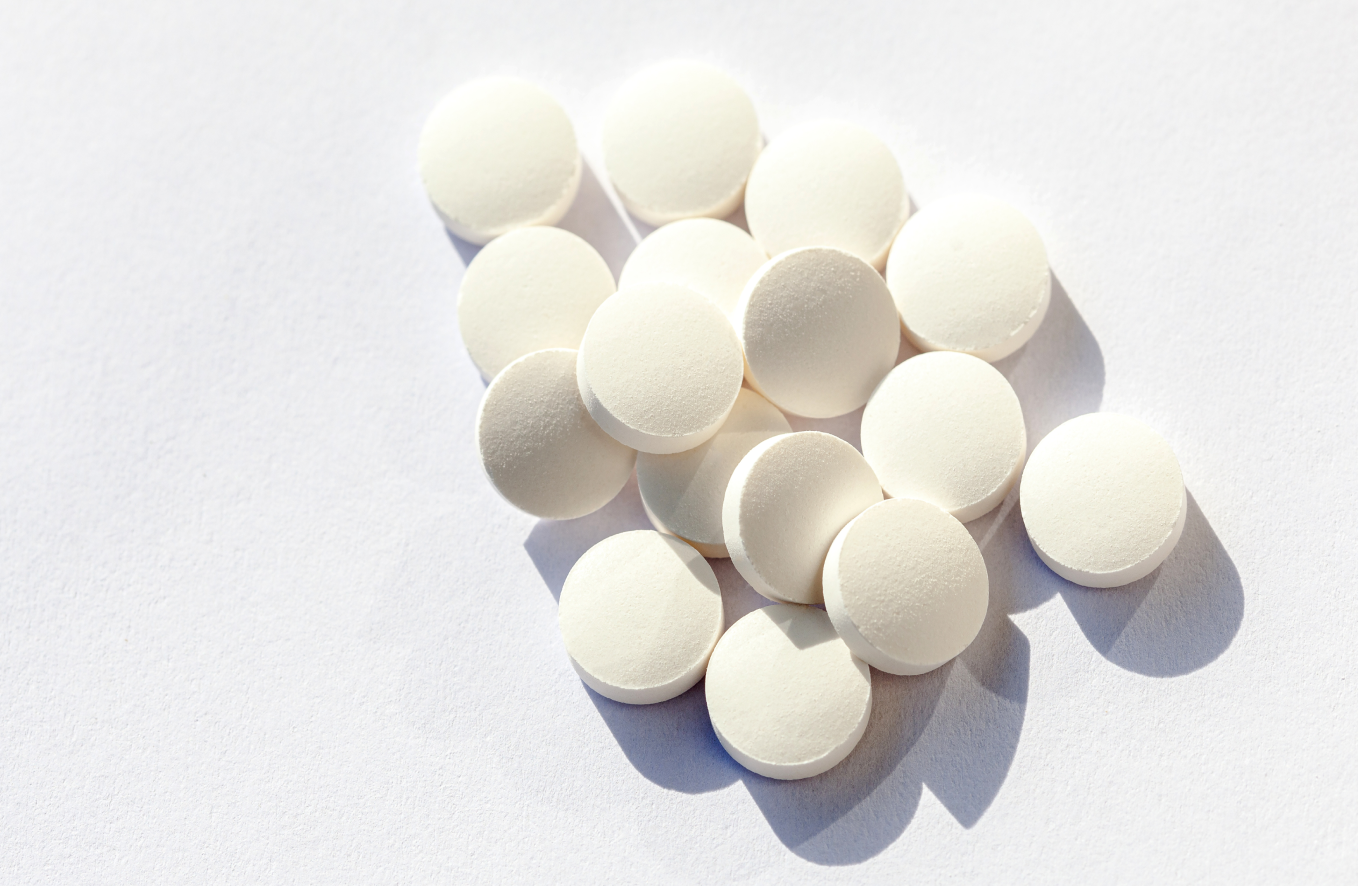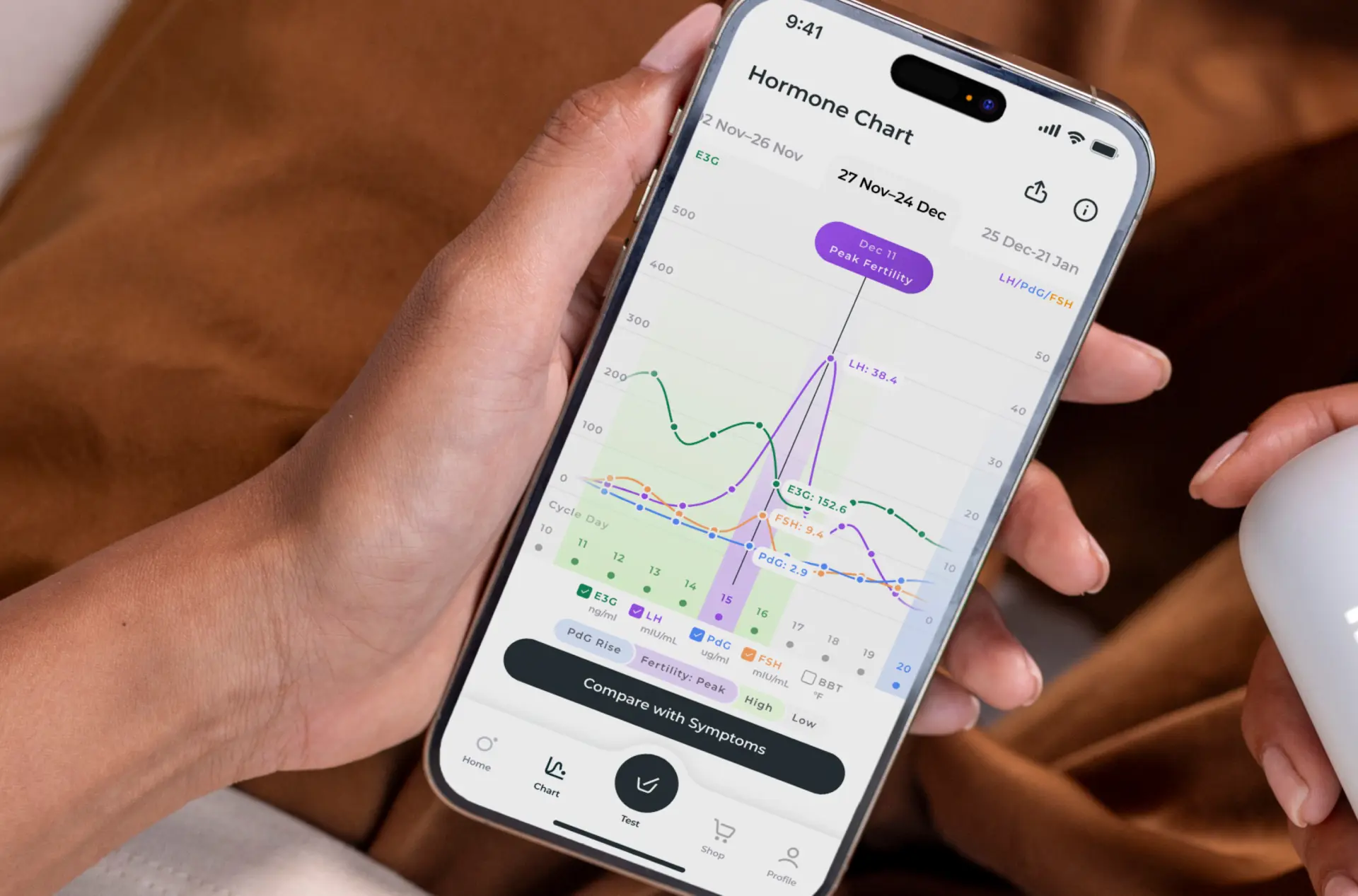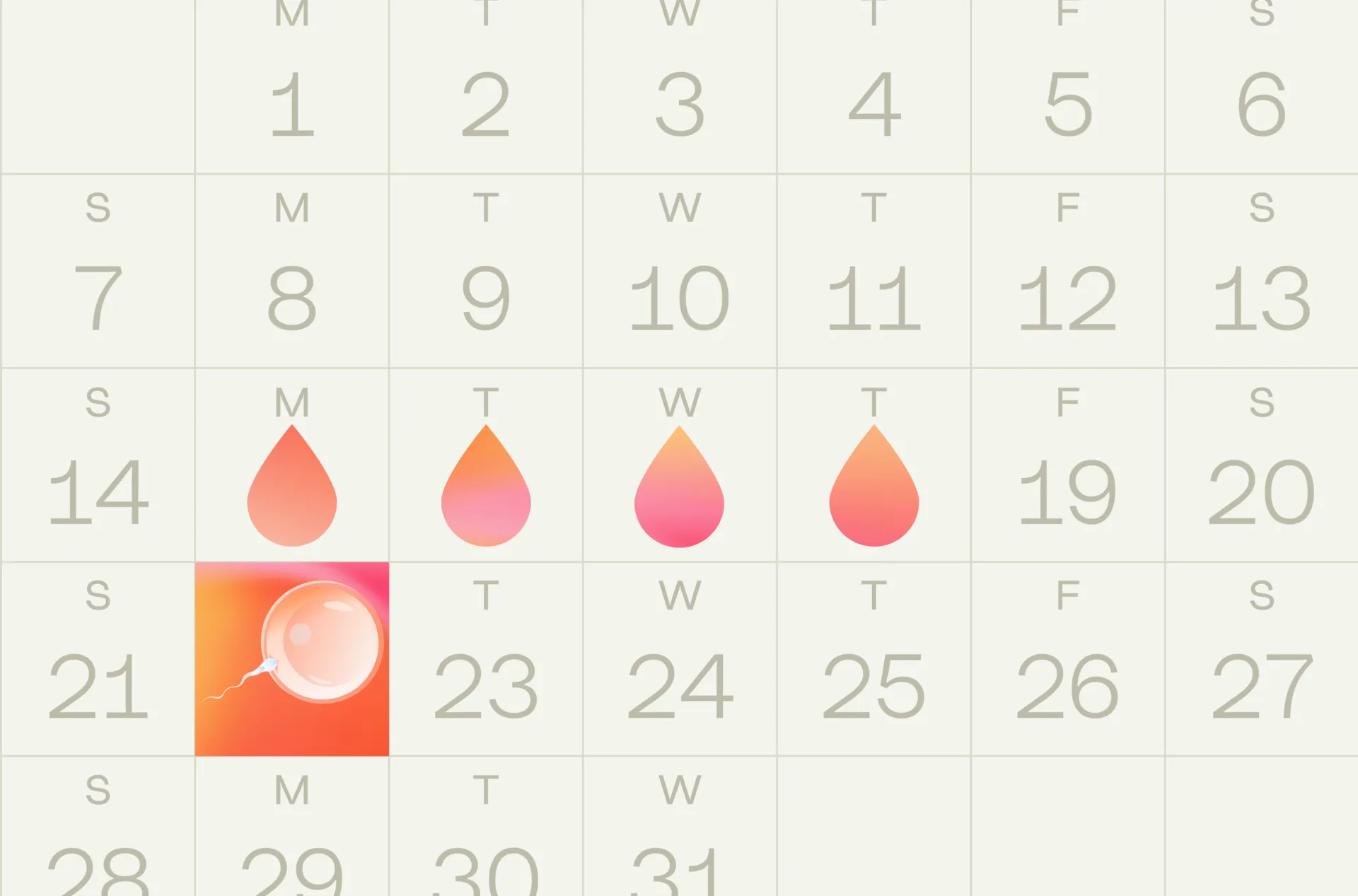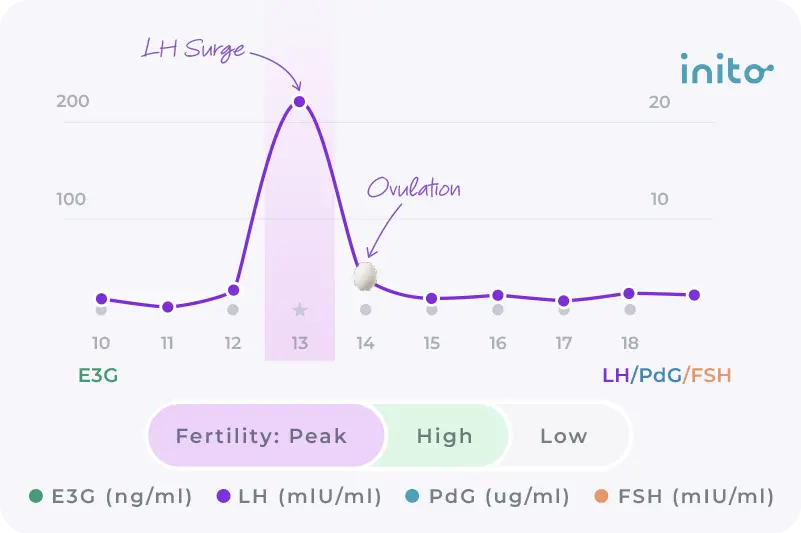Content table
Figuring out what to do about your high androgen levels as a PCOS warrior? You’re nowhere near alone in this struggle.
In fact, about 75–90% of PCOS patients experience hyperandrogenemia (excess androgen). That’s why having high androgen levels is one of the tell-tale signs of PCOS.
There are several treatment options for excess androgen. One you may have already heard of is spironolactone.
Want to learn more about how spironolactone could help? Follow along for all you need to know about taking spironolactone for PCOS.
Key Takeaways
- Spironolactone is commonly used as a diuretic. But it also has the ability to block excess androgens. For this reason, it’s sometimes used as a treatment for PCOS symptoms like hirsutism and acne.
- For PCOS patients, spironolactone works by slowing testosterone production. This then helps lower the overall amount of androgens in your system.
- So this medication can help with achieving a better hormonal balance. This balance is the key to seeing an improvement in symptoms such as excessive hair growth and acne.
- Research shows that spironolactone can be an effective treatment for hyperandrogenemia. The typical dosage ranges from 50mg – 200mg depending on the goal of its usage.
- Symptom relief through spironolactone can happen within 2 – 4 months.
- Be aware that spironolactone can cause certain side effects. It’s also not recommended to be used while trying to conceive.
- To determine if you should use spironolactone for your unwanted polycystic ovary syndrome symptoms, talk to your doctor!
What Is Spironolactone and How Does It Work?
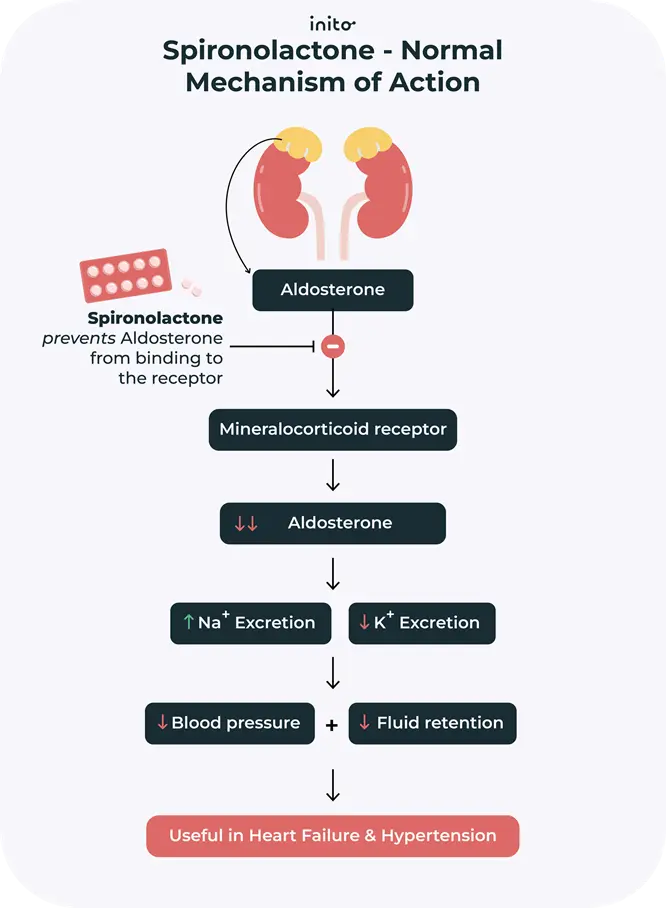
Spironolactone, aka Aldactone®, is a versatile drug that can help with a variety of conditions.
It’s mainly known for being a diuretic that blocks the effects of the hormone aldosterone. (This hormone ensures your body has a healthy balance of water and salt.)
By limiting aldosterone and its effect, spironolactone reduces the amount of fluid your body retains. On top of that, it helps lower your blood pressure. This is why spironolactone is often used to treat hypertension and heart failure.
But how does spironolactone work for PCOS?
- It puts the brakes on the enzyme that creates testosterone.
- This lowers testosterone production and improves the drug’s metabolic clearance.
- This decreases the overall amount of testosterone androstenedione circulating throughout the body.
- The best part? It does this all without affecting the adrenal androgens. (This is important because you need a small amount of adrenal androgens for a regulated cycle.)
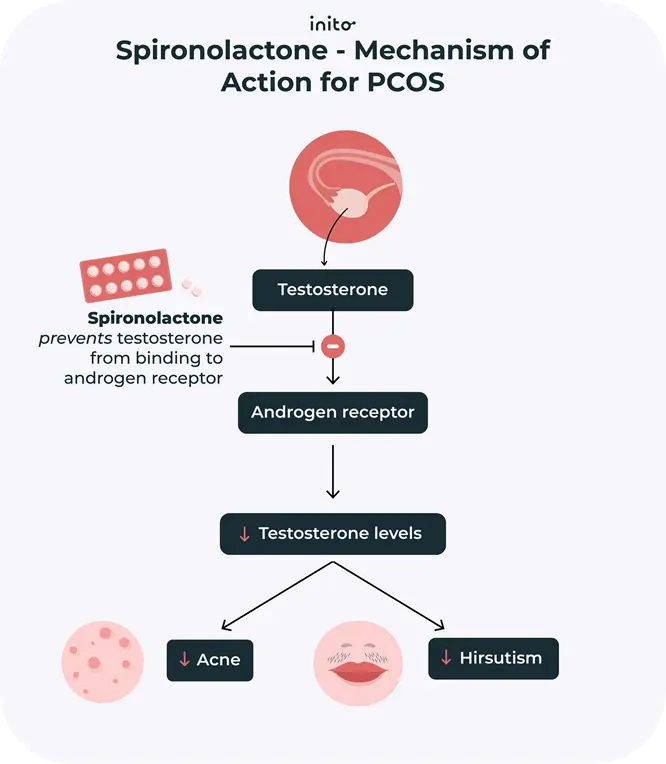
What Are the Benefits of Spironolactone for PCOS?
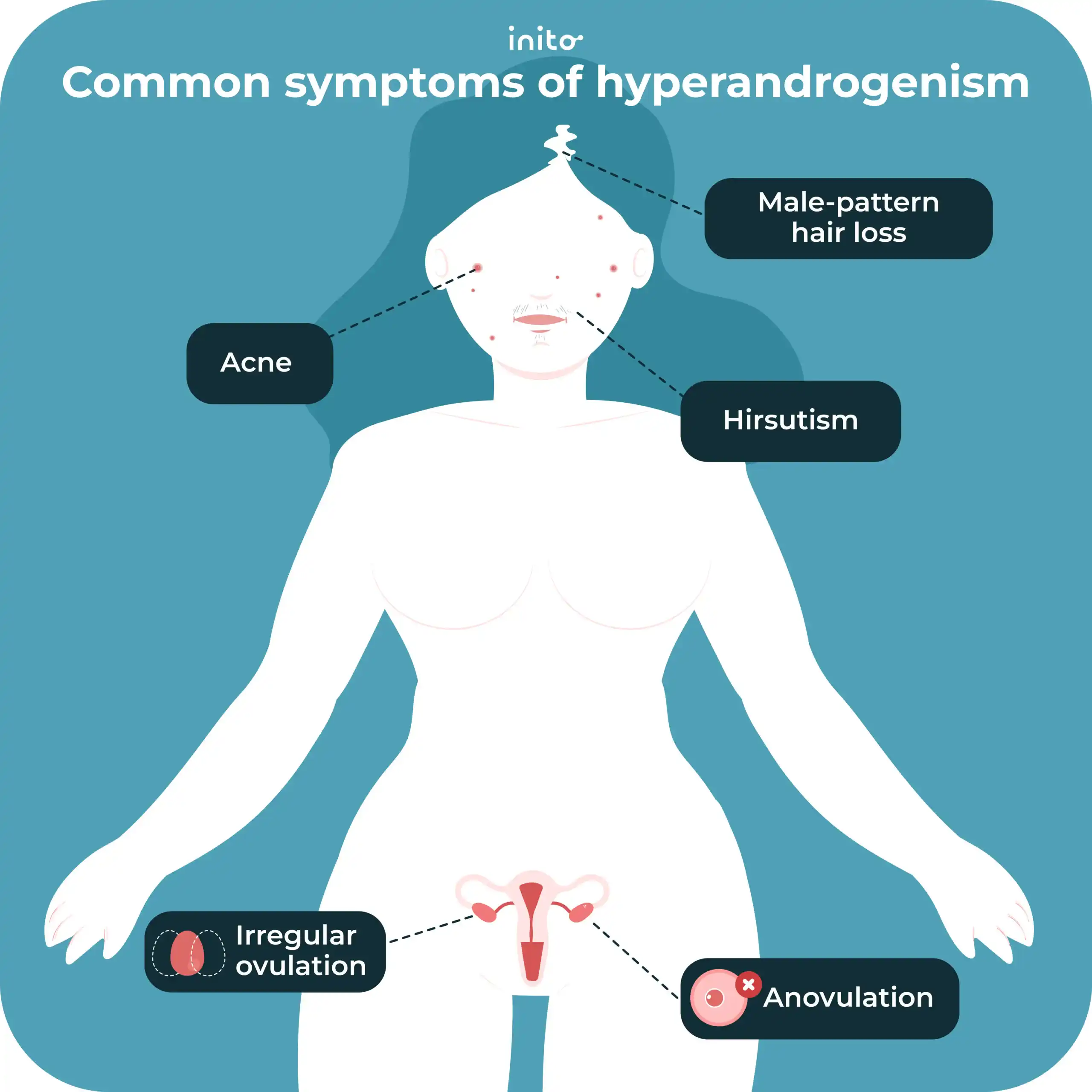
One of the most common symptoms of PCOS is an excess amount of androgens (aka hyperandrogenism). For women, PCOS is actually the most common cause of androgen excess. In one study, approximately 82% of women with androgen were found to have PCOS.
Now, it’s normal for women to have a small amount of androgens. But if you have androgen excess, you’ll likely experience unwanted symptoms.
Some common symptoms of hyperandrogenism include:
- Irregular ovulation
- Anovulation
- Acne
- Hirsutism (this refers to excessive hair growth on the face, chin, chest, abdomen, and back)
- Male-pattern hair loss (hair loss or thinning hair around the scalp)
By lowering testosterone, spironolactone helps restore hormonal balance. Then you’ll begin having relief from some of these pesky symptoms (like acne and hair loss).
See how your hormone chart might look like!
Answer some questions to help us provide you a free personalized hormone chart customized to your hormonal health and conditions
Think this may be a potential treatment option for you? Then let’s talk about how spironolactone can help with specific symptoms of PCOS. Keep reading!
How Effective Is Spironolactone for PCOS Symptoms?
PCOS has been proven to improve PCOS symptoms like acne and hirsutism. Below, you’ll get a firsthand look at what some of the latest research shows.
Hirsutism
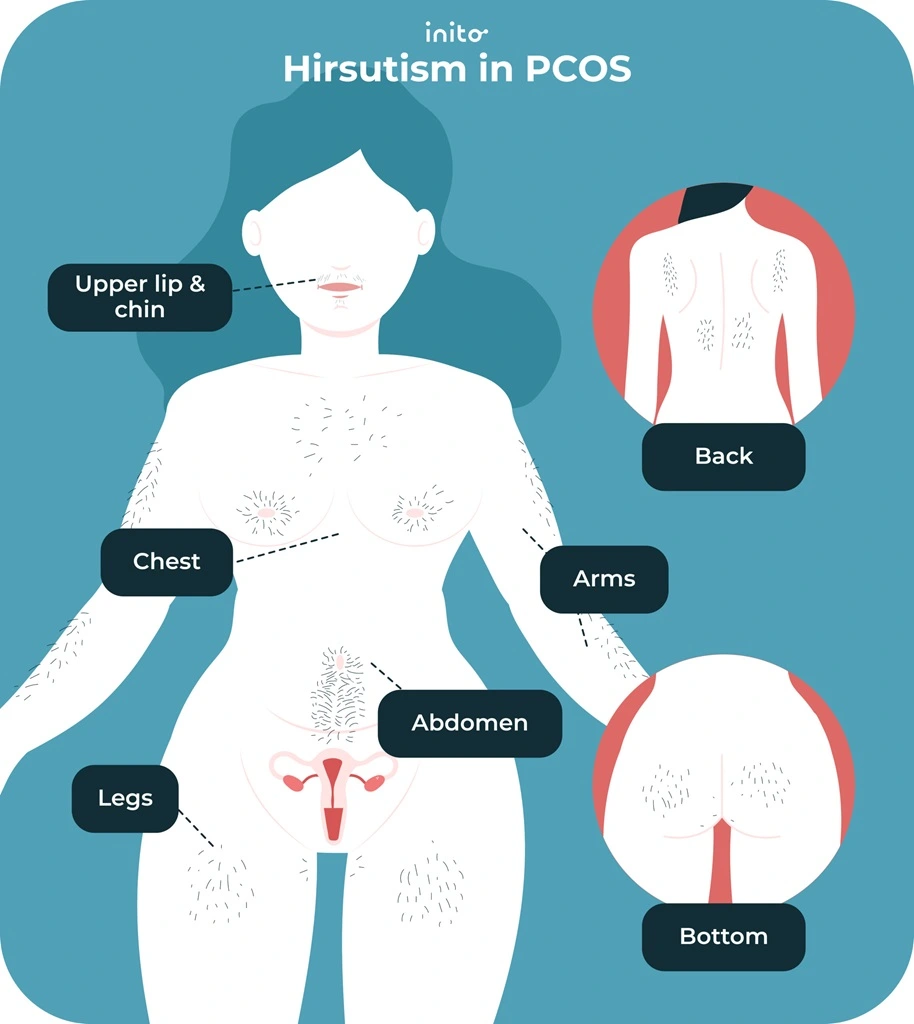
Hirsutism is when women have hair growing in places they normally wouldn’t (like the face, chest, abdomen, or back). It’s important to know that the first line of defense in treating this unwanted hair growth is birth control. But if you’ve been using a birth control pill for more than six months, adding on spironolactone may help. And with the help of your healthcare provider, you can figure out a dosage that works best for you.
One study found that using a spironolactone dosage of 100 mg per day helped with excessive hair growth. Some of the trials that this study looked at were relatively small. But still, there was evidence that the spironolactone was more effective than the placebo. This is inspiring news if you’re considering Spironolactone treatment for PCOS.
Acne
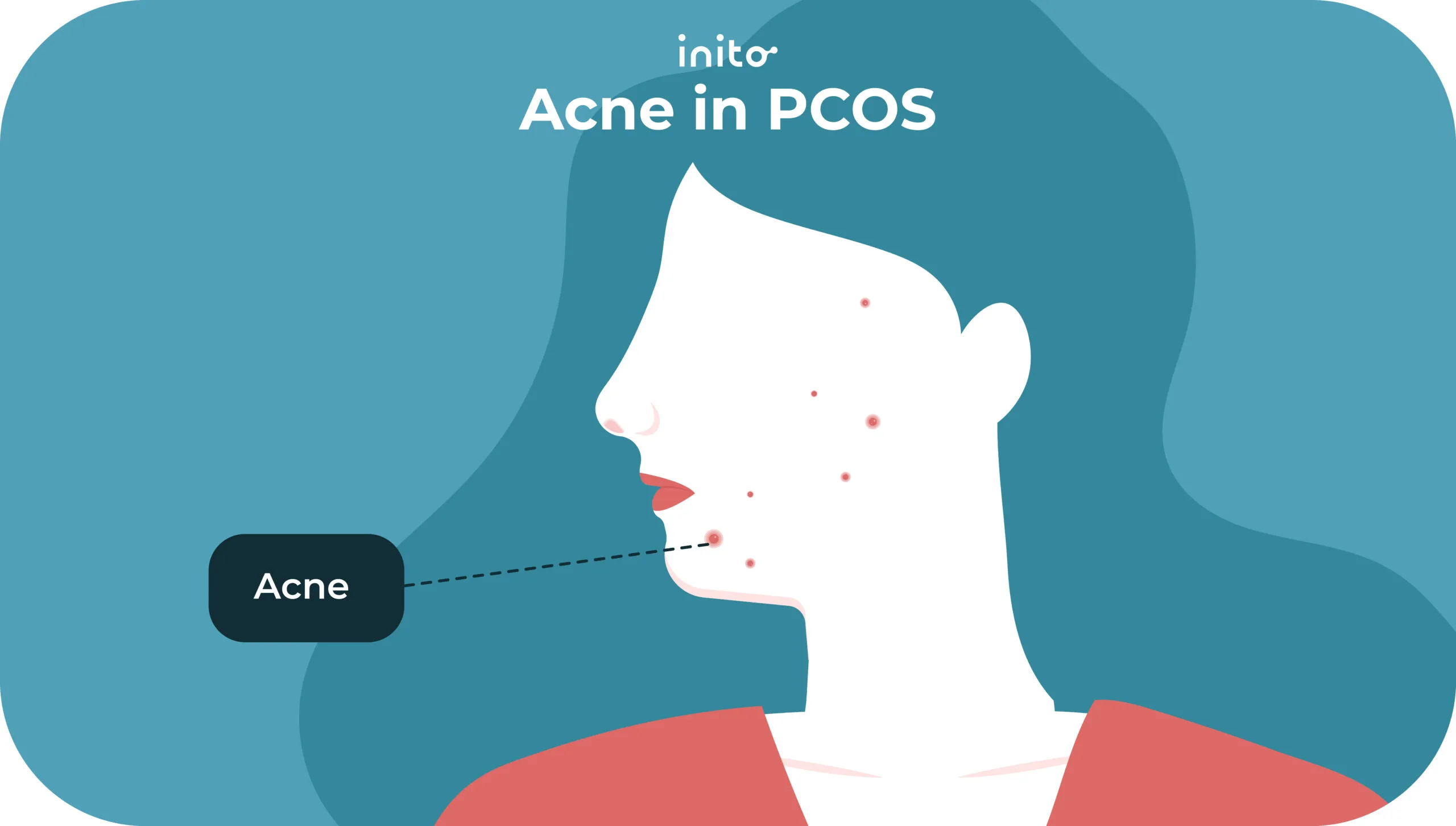
Spironolactone has also been used to help with acne caused by PCOS. One study followed nearly 400 women who were given 100 mg of spironolactone daily.
In just 3 to 5 months, almost 2 in every 3 study participants achieved complete acne symptom improvement with this dosing. And all but 15% of the patients had at least a partial response of 50% or more.
In the study, these noticeable improvements were for different levels of acne severity. This even included women who had papulopustular acne and nodulocystic acne. (Both of these are more severe forms of acne).
So if you’re wishing to clear up your PCOS-related acne, taking spironolactone could be a viable option.
Either way, it’s a good idea to have a realistic picture of how long it could take to notice any improvements in symptoms. We’ll go over that next, so stick with us.
How Long Does Spironolactone Take to Work for PCOS?
Look at the table below based on the target symptom you’re treating. You’ll get a glimpse at how long it may take to see improvements while on spironolactone.
Symptom | How long before improvements are noticed while taking spironolactone? |
Hirsutism (facial hair growth) | One study observed a noticeable difference in a span of 2 months. These improvements were seen for the diameter, rate, and density of the hair growth. For the maximum results, it took closer to 6 months. And these improvements continued through 12 months. |
Acne | Skin oiliness caused by acne can improve in just 2-4 months. |
As you can see, spironolactone can help relieve these hyperandrogenism symptoms. But in the meantime, you can also lean on more temporary but straightforward treatments. For example, you can consider waxing, tweezing, or laser hair removal.
What's the Best Spironolactone Dosage for PCOS?
The ideal dosage for spironolactone to achieve results will vary from woman to woman. It will also depend on the particular symptoms you’re looking to treat with the drug.
If you’re taking it to treat acne, Your doctor will most likely recommend a dose of about 50 – 150 mg per day for 1 – 2 years. This may include some pauses in between. These breaks give you time to reflect on the effectiveness of the medication for you.
If you’re treating hirsutism, a standard spironolactone dosage is 100 – 200 mg per day for 2 years. At first, this dosing should slow hair growth. After a while, it should result in finer hair and then significantly decreased hair. For this symptom, there are usually fewer or no treatment breaks.
Disclaimer: Spironolactone requires a prescription and should only be taken under the supervision of your healthcare provider.
Before deciding if spironolactone is an option for you, let’s look at the potential side effects.
What Are the Side Effects of Spironolactone?
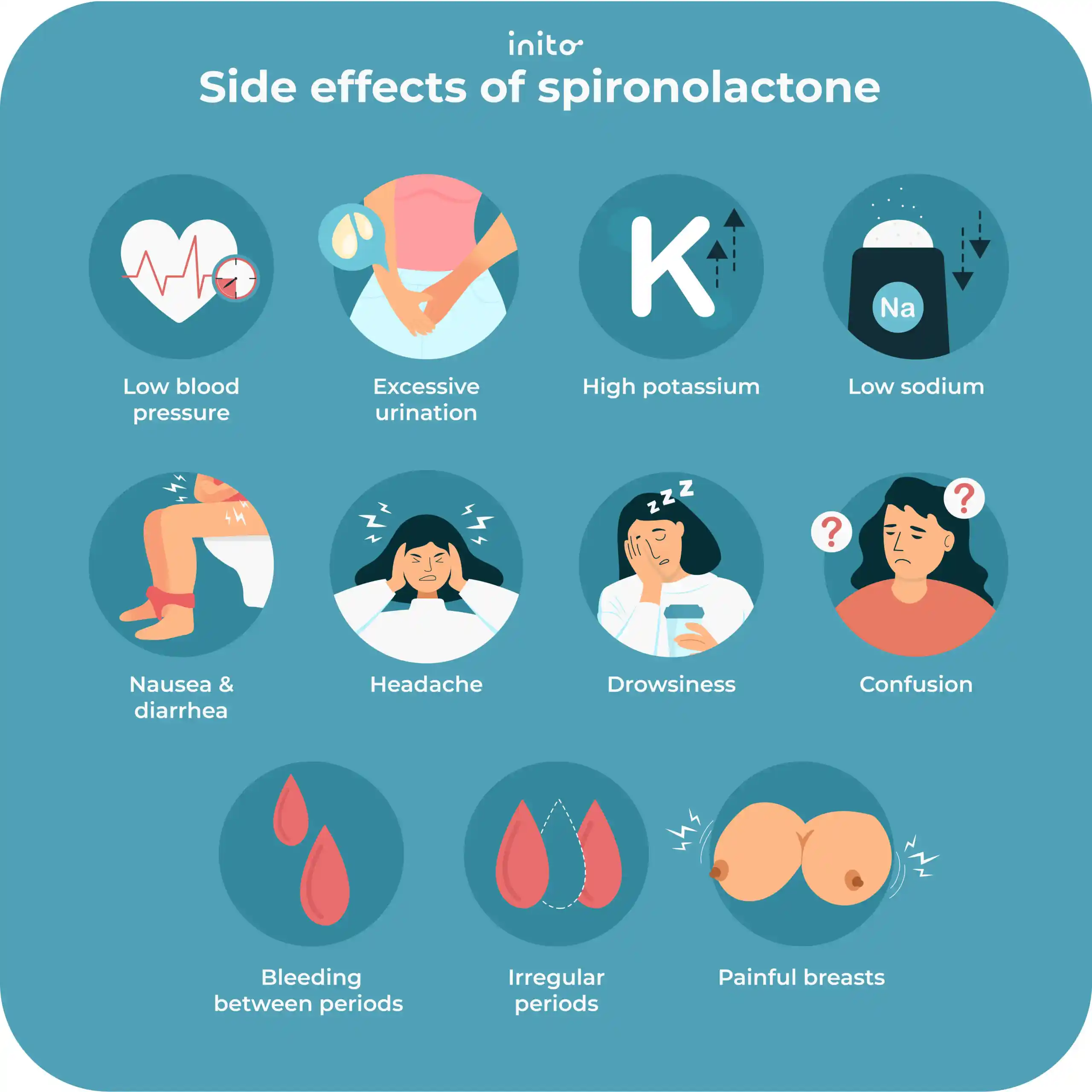
Remember, spironolactone works for PCOS by blocking aldosterone production.
Because of this, it can lead to symptoms like:
- Low blood pressure
- Excessive urination
- High potassium (aka hyperkalemia)
Note: This is a dangerous medical condition. It can cause symptoms like arrhythmia, heart palpitations, and muscle weakness)
- Low sodium
- Tummy troubles like nausea, vomiting, and diarrhea
- Headache
- Drowsiness
- Confusion
You could also experience additional symptoms besides the ones listed above. Some additional effects you could experience include:
- Bleeding between periods (aka intermenstrual bleeding)
- Irregular periods (since it throws off the usual hormonal balance, the timing of menstruation can be impacted)
- Painful breasts
And just FYI! Be cautious of taking spironolactone if you have other health conditions. Have heart or kidney problems, take potassium supplements, or take other diuretics? Talk to your doctor about the safety of taking spironolactone.
Can I Take Spironolactone if I'm Trying to Conceive?
It’s not considered safe to take this medication when you’re trying to conceive (TTC). This is because the medication could impact the sex differentiation in male fetuses.
Typically, spironolactone will be prescribed alongside birth control. And you would only take birth control pills when looking to prevent a pregnancy.
But what if you decide to use spironolactone as part of your PCOS treatment plan and want to get pregnant? This is not uncommon. In this case, you would simply stop taking the spironolactone at least a month prior to TTC. This gives your body enough time for the drug to completely leave your system. At that point, it’s safe to actively try to get pregnant.

FAQs
Yes, spironolactone can help with some symptoms of PCOS. Most often, it’s prescribed to help treat hirsutism and acne.
The most common medications prescribed are oral contraceptives, antiandrogens (like spironolactone), and insulin-lowering or insulin-sensitizing medications. But there is no one medicine considered the “best” for treating symptoms of PCOS. This is because there are a range of symptoms women with PCOS experience, and different symptoms respond to different treatments. To determine the best treatment for you, consult with your doctor. You’ll need to account for your overall health and fertility goals as well.
Not necessarily. Since spironolactone is a diuretic, one side effect you could experience is excessive urination. This could cause you to lose water weight. But there’s no definitive evidence that using the medication long-term as a treatment for PCOS leads to weight loss or weight gain. It’s also important to keep hydrated if you do notice you’re peeing more than normal.
Was this article helpful?
- Hyperandrogenism in Women with Polycystic Ovarian Syndrome: Pathophysiology and Controversies | Androgens: Clinical Research and Therapeutics
- Androgen Excess in Women: Experience with Over 1000 Consecutive Patients | The Journal of Clinical Endocrinology & Metabolism | Oxford Academic
- Spironolactone versus placebo or in combination with steroids for hirsutism and/or acne
- Treatment of acne with spironolactone: a retrospective review of 395 adult patients at Mayo Clinic, 2007–2017
- Treatment of Hirsutism With Spironolactone | JAMA
- Spironolactone – American Osteopathic College of Dermatology (AOCD)
- Spironolactone – StatPearls – NCBI Bookshelf
- Drugs to avoid preconceptionally
- Treatment of Acne Vulgaris During Pregnancy and Lactation: A Narrative Review – PMC
- Side Effects of Spironolactone Therapy – NIH



